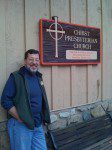
03 Mar PAT BAILEY: SPIRITUALITY WITH RELIGION, 3-4-2012
 In my weekly column in Telluride Inside… and Out, I have been talking about the “spiritual revolution” as described by religious scholars Paul Heelas and Linda Woodhead in “The Spiritual Revolution: Why Religion is Giving Way to Spirituality.” They characterize the change as a shift to a subjective life view and a holistic milieu.
In my weekly column in Telluride Inside… and Out, I have been talking about the “spiritual revolution” as described by religious scholars Paul Heelas and Linda Woodhead in “The Spiritual Revolution: Why Religion is Giving Way to Spirituality.” They characterize the change as a shift to a subjective life view and a holistic milieu.
Philosopher Charles Taylor also points to a subjective turn as he maps the series of departures that have destabilized the former cultural influences of religion (see Charles Taylor, “A Secular Age”). Taylor focuses on the conditions of belief, particularly “the move from a society where belief in God is unchallenged and indeed, unproblematic, to one in which it is understood to be one option among others, and frequently not the easiest to embrace.” What modern secularity has provided is the rise of a “reflective” framework which makes possible different kinds of experience that were impossible or not allowed in earlier ages. So, for Taylor the most notable aspect of secularity “consists of new conditions of belief; it consists in a new shape to the experience with prompts to and is defined by belief; in a new context in which all search and questioning about the moral and spiritual must proceed.” Taylor also notes the radical difference between this shift to secularity and the cultural and religious shifts of the past:
“The main feature of this new context is that it puts an end to the naive acknowledgment of the transcendent, or of goals or claims which go beyond human flourishing. But this is quite unlike religious turnovers in the past, where one naive horizon ends up replacing another, or the two fuse syncronistically. . . . Naiveté is now unavailable to anyone, believer or unbeliever alike.”
Do you agree or disagree with Taylor’s description of the new conditions of belief that characterize the secular age? Our ancestors could not have imagined a worldview without religious belief, largely shaped by their cultures. Do you consider the move to a worldview where religious belief is considered to be one option among others something positive or negative? Do you agree or disagree that a naive acknowledgement of the transcendent or goals and claims beyond human flourishing are no longer available to persons in a late-modern context? Is Naiveté the only way of maintaining faith and spirituality, or are their other options for refiguring religious worldviews in our late-modern context? Join the conversation and I promise to address your views in upcoming posts.


Sorry, the comment form is closed at this time.